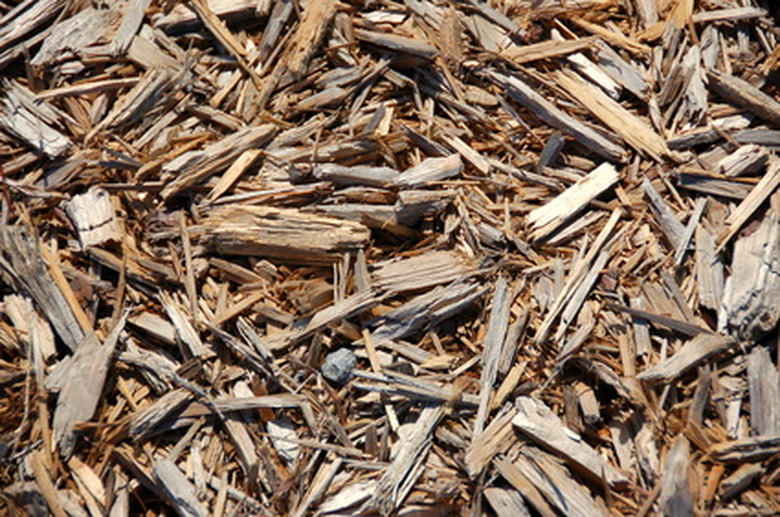Cedar Mulch Vs. Hardwood Mulch
Mulch has gained popularity in recent years for its attractive appearance and numerous benefits to nearby plants. A wide variety of wood-based mulches is available on the market for use in home gardens and landscape settings; questions surrounding each option concern the effects on plants of mulch as it decomposes. Generally speaking, any type of wood-based mulch is beneficial for plants, and the chemical effects of leaching and decomposition are negligible.
About Cedar Mulch
Though advertised as "cedar," most products labeled as cedar mulches are actually derived from cypress, arborvitae or juniper. Persistent rumors about true cedar mulches, however, include suggestions that the aromatic chemical components of cedar wood may harm plants, causing damage ranging from poor seed germination to poisoning plants' root systems. Associate Professor Chris Starbuck, of the University of Missouri's plant sciences department, performed experiments on cedar mulch's effects on seeds and toxicity to plants, or phytotoxicity. His results showed no measurable difference between plants growing in close proximity to cedar mulch versus those with no contact.
- Mulch has gained popularity in recent years for its attractive appearance and numerous benefits to nearby plants.
- A wide variety of wood-based mulches is available on the market for use in home gardens and landscape settings; questions surrounding each option concern the effects on plants of mulch as it decomposes.
About Hardwood Mulch
Hardwood mulches are derived from the shredded or chipped bark and heartwood of trees, including oak, poplar and maple. Despite the name, hardwood mulches actually decompose faster in the landscape than cedar or pine bark mulch, owing to a higher cellulose content. Cellulose readily decays on exposure to air and water, and many types of fungi and bacteria favor cellulose as a food source. Hardwood mulches may also cause nitrogen deficiencies in the soil precisely due to the presence of these cellulose-eating microbes, which can cause nearby plants to starve from lack of nitrogen. Amending hardwood mulches with grass clippings or a nitrogen-rich fertilizer is one way to remedy this common problem.
Benefits of Mulches
Two of the main benefits of mulch are that it helps to shade the soil from direct sunlight and slows the rate of evaporation of water from the soil. Shaded soil, in turn, means shaded roots, which keeps plants healthier during hot summer months. Unless the mulched area is prone to flooding or extreme runoff, mulch also slows erosion. Mulch also helps suppress weed seed germination and growth, reducing competition for nutrients and water with garden plants. Beyond the ecological benefits, many homeowners and landscapers like the unified, clean look of a freshly mulched area, and colored mulches can be used to match the garden area with a house's paint or other feature of the landscape.
- Hardwood mulches are derived from the shredded or chipped bark and heartwood of trees, including oak, poplar and maple.
- Despite the name, hardwood mulches actually decompose faster in the landscape than cedar or pine bark mulch, owing to a higher cellulose content.
Mulch and Insects
Cedar mulch is often touted as possessing insect-repelling qualities. This claim is only partially true: The aromatic oils in cedar wood decay quickly and act only for a short time in an insect-repelling capacity. Fresh cedar mulch would need to be applied on a regular basis throughout the growing season to continue providing this benefit. Even so, attracting bugs to the garden is usually more of a benefit than a problem. Mulches provide hiding places for many beneficial decomposers and hunters, such as pillbugs, centipedes, spiders and ants. Earthworms are also attracted to the cool, shaded areas beneath mulch.
Decomposition and Soil pH
Contrary to popular belief, decomposing organic mulches actually tend to raise the pH of soil over time; that is, decomposed mulch makes soil less acidic. Mulches generally thought to be acidic in nature, such as pine needles, cedar chips and leaves, leave behind a fair quantity of inorganic minerals in the soil once they are thoroughly decomposed. Over time, this leads to lower levels of acidity in soils, rather than the higher levels most people assume would result. Especially around acid-loving plants and trees like dogwoods, rose bushes and blueberries, incorporating sulfur amendments into the soil will keep these specimens healthy as the surrounding mulches degrade.
- Cedar mulch is often touted as possessing insect-repelling qualities.
- Mulches generally thought to be acidic in nature, such as pine needles, cedar chips and leaves, leave behind a fair quantity of inorganic minerals in the soil once they are thoroughly decomposed.
